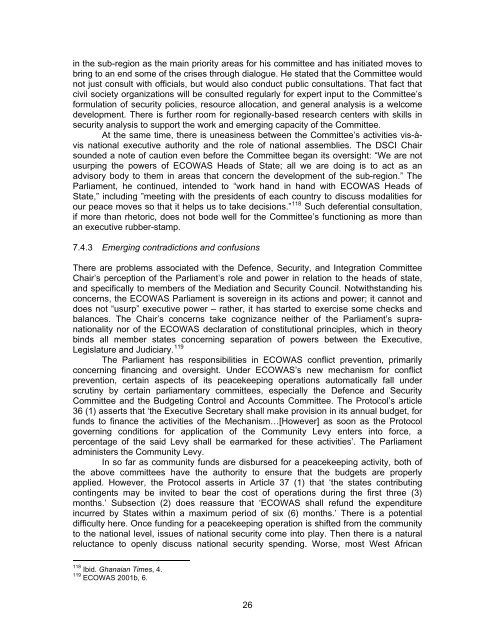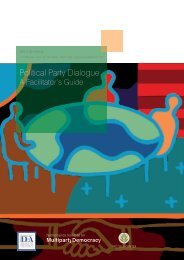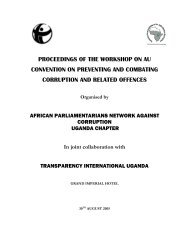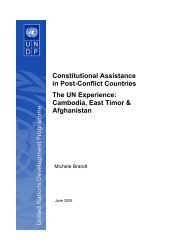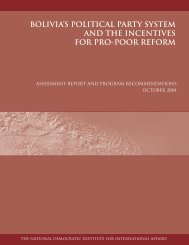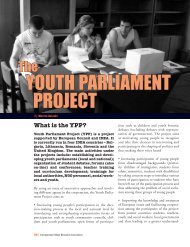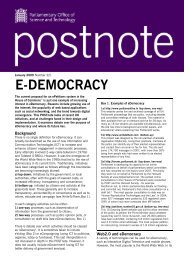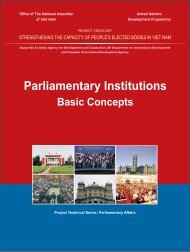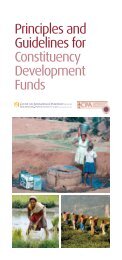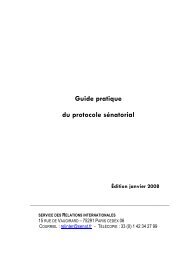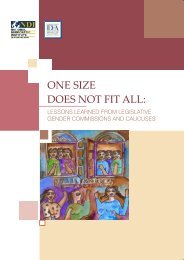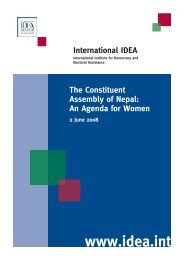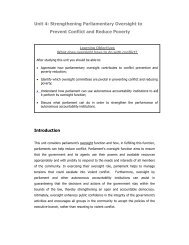Parliamentary Oversight of the Security Sector: Lessons from Ghana
Parliamentary Oversight of the Security Sector: Lessons from Ghana
Parliamentary Oversight of the Security Sector: Lessons from Ghana
You also want an ePaper? Increase the reach of your titles
YUMPU automatically turns print PDFs into web optimized ePapers that Google loves.
in <strong>the</strong> sub-region as <strong>the</strong> main priority areas for his committee and has initiated moves tobring to an end some <strong>of</strong> <strong>the</strong> crises through dialogue. He stated that <strong>the</strong> Committee wouldnot just consult with <strong>of</strong>ficials, but would also conduct public consultations. That fact thatcivil society organizations will be consulted regularly for expert input to <strong>the</strong> Committee’sformulation <strong>of</strong> security policies, resource allocation, and general analysis is a welcomedevelopment. There is fur<strong>the</strong>r room for regionally-based research centers with skills insecurity analysis to support <strong>the</strong> work and emerging capacity <strong>of</strong> <strong>the</strong> Committee.At <strong>the</strong> same time, <strong>the</strong>re is uneasiness between <strong>the</strong> Committee’s activities vis-àvisnational executive authority and <strong>the</strong> role <strong>of</strong> national assemblies. The DSCI Chairsounded a note <strong>of</strong> caution even before <strong>the</strong> Committee began its oversight: “We are notusurping <strong>the</strong> powers <strong>of</strong> ECOWAS Heads <strong>of</strong> State; all we are doing is to act as anadvisory body to <strong>the</strong>m in areas that concern <strong>the</strong> development <strong>of</strong> <strong>the</strong> sub-region.” TheParliament, he continued, intended to “work hand in hand with ECOWAS Heads <strong>of</strong>State,” including ”meeting with <strong>the</strong> presidents <strong>of</strong> each country to discuss modalities forour peace moves so that it helps us to take decisions.” 118 Such deferential consultation,if more than rhetoric, does not bode well for <strong>the</strong> Committee’s functioning as more thanan executive rubber-stamp.7.4.3 Emerging contradictions and confusionsThere are problems associated with <strong>the</strong> Defence, <strong>Security</strong>, and Integration CommitteeChair’s perception <strong>of</strong> <strong>the</strong> Parliament’s role and power in relation to <strong>the</strong> heads <strong>of</strong> state,and specifically to members <strong>of</strong> <strong>the</strong> Mediation and <strong>Security</strong> Council. Notwithstanding hisconcerns, <strong>the</strong> ECOWAS Parliament is sovereign in its actions and power; it cannot anddoes not “usurp” executive power – ra<strong>the</strong>r, it has started to exercise some checks andbalances. The Chair’s concerns take cognizance nei<strong>the</strong>r <strong>of</strong> <strong>the</strong> Parliament’s supranationalitynor <strong>of</strong> <strong>the</strong> ECOWAS declaration <strong>of</strong> constitutional principles, which in <strong>the</strong>orybinds all member states concerning separation <strong>of</strong> powers between <strong>the</strong> Executive,Legislature and Judiciary. 119The Parliament has responsibilities in ECOWAS conflict prevention, primarilyconcerning financing and oversight. Under ECOWAS’s new mechanism for conflictprevention, certain aspects <strong>of</strong> its peacekeeping operations automatically fall underscrutiny by certain parliamentary committees, especially <strong>the</strong> Defence and <strong>Security</strong>Committee and <strong>the</strong> Budgeting Control and Accounts Committee. The Protocol’s article36 (1) asserts that ‘<strong>the</strong> Executive Secretary shall make provision in its annual budget, forfunds to finance <strong>the</strong> activities <strong>of</strong> <strong>the</strong> Mechanism…[However] as soon as <strong>the</strong> Protocolgoverning conditions for application <strong>of</strong> <strong>the</strong> Community Levy enters into force, apercentage <strong>of</strong> <strong>the</strong> said Levy shall be earmarked for <strong>the</strong>se activities’. The Parliamentadministers <strong>the</strong> Community Levy.In so far as community funds are disbursed for a peacekeeping activity, both <strong>of</strong><strong>the</strong> above committees have <strong>the</strong> authority to ensure that <strong>the</strong> budgets are properlyapplied. However, <strong>the</strong> Protocol asserts in Article 37 (1) that ‘<strong>the</strong> states contributingcontingents may be invited to bear <strong>the</strong> cost <strong>of</strong> operations during <strong>the</strong> first three (3)months.’ Subsection (2) does reassure that ‘ECOWAS shall refund <strong>the</strong> expenditureincurred by States within a maximum period <strong>of</strong> six (6) months.’ There is a potentialdifficulty here. Once funding for a peacekeeping operation is shifted <strong>from</strong> <strong>the</strong> communityto <strong>the</strong> national level, issues <strong>of</strong> national security come into play. Then <strong>the</strong>re is a naturalreluctance to openly discuss national security spending. Worse, most West African118 Ibid. <strong>Ghana</strong>ian Times, 4.119 ECOWAS 2001b, 6.26


